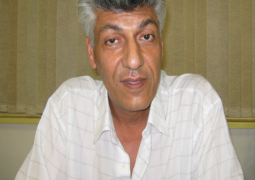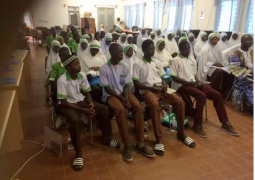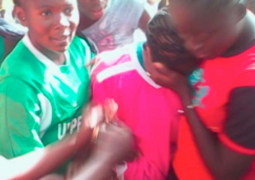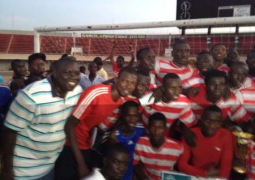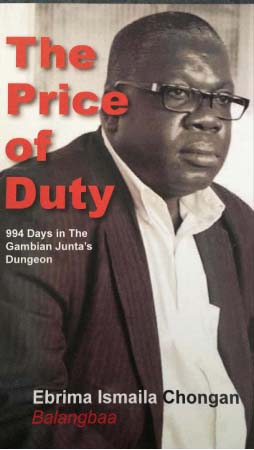
Reviewed by Hassoum Ceesay
If
Chongan had spent just another six days at Mile Two, he would have been in
detention for as long as J.F Kennedy was President of the United States of
America, 1961-1963! This is the best
piece of Gambian prison writing I have read so far among the few we have.
The poetry prison musings of Fodeh Baldeh’s
Fate of an African President, which explains his detention in 1981 after the
Kukoi coup attempt, was the first piece of Gambian prison writing. Papa Jeng,
who died in 2019, also wrote in the book ‘Detained at His Excellency’s
Pleasure...’, on his time at Mile Two
serving detention time also as an accused in the Kukoi coup. Now we have this
cream on top of all of them, Mr. Chongan’s moving memoire cum prison diary. I
am sure that with the possibilities offered by New Gambia, more prison veterans
will, or are in fact, penning their diaries and memoirs. With his book, now we
critics can assume, rightly, that there is a new genre in our literature called
Gambian Prison Writings!
In
the early pages of the book (page xi) Chongan acknowledges the inspiration
given him after reading Abdoulaye Diallo
dit Porthos’s moving memoir of his time at Sekou Toure infernal dungeon, Camp
Boiro, where the Guinean Minister of Youths
served from 1971 to 1980 uncharged and of course untried. This book
Verite Du Ministre: Dix Ans Dans le Geoles De Sekou Toure helped to put the nail
on the evilness of Camp Boiro as a piece of hell inside Conakry.
The torture, executions, rape, deprivation of
food and forced confessions all came out in that book to the astonishment of
the world. In Chongan’s book also we have what may as well be the last word on
the inhumanity that reigned at Mile Two during the period the author was there.
After reading this book, one cannot anymore be in denial that Mile Two was our
exceedingly Hadean spot.
The
book is divided into four chapters. In Chapter One, the author celebrates his
one-man attempt ‘to stop a coup’. Here the reader can have many questions
swirling in his or her head: was it an ill-fated attempt, a reckless attempt or
a genuine attempt to stymie an illegal act? The author is proud to have been
the sole man in the security apparatus to have tried to stop the coup by firing
his ‘AK47 rifle’, signaling for ‘the ambush to begin’, page 8. On record, this
was the only shot ever fired to save the 32 years old Gambian democracy under
Sir Dawda. A single shot from Chongan was not able to stop the rebel soldiers’
movement towards State House, but is enough to put him in the history books as
the lone officer to resist the coup. Chongan tried to destroy the incipient
‘revolution’. It is usual for revolutions to destroy men, but for one man to
try to destroy a whole ‘revolution’, that is suicidal.
A
chunk of this chapter is on the failures within Jawara’s security apparatus
which helped the coup to succeed. The intelligence service under the NSS was
ripped apart with personality differences amongst its higher echelons, page 39;
even Chongan himself bemoans (on page 40), how he felt let down by his own boss
who kept him in the dark throughout the unfolding of the coup. These
accusations show that all was not well with the Jawara-era security forces.
This created a gap which the coup leaders sneaked through to reach State House.
However, under Jawara, the security forces were operating within a democratic
context such that what may seem in hindsight to be slowness or inaction may
have been as a result of the desire to follow hierarchy and operational
procedure. Despotic regimes need not have a smoking gun to take action against
any suspect, but democracies do.
In
Chapter Two the author takes us through a flashback of the 1981 coup attempt
led by Kukoi Samba Sanyang. The author believes that this one bloody incident
of July 30 1981 was the root of the coup of 1994 by commission and by omission,
pages 20, 21. He concludes by describing the AFPRC coup as ‘an accidental’ coup
meaning that a few steps taken otherwise could have nipped the coup in the bud.
This chapter shows that although the author takes a chronological approach to
the story, the narrative is not teleological. The author now and then pauses to
give a copious background information to events and characters before resuming
his tale.
In
Chapter Three, the author narrates his arrests on 25 July at the Police HQ in
Banjul. ’You should also be arrested’ were the few words which a junta member
had to utter for Chongan to begin his prison time. The phrase rather shows how
quickly the rule of law had began to degenerate! The arrest was a spectacle as
the once mighty security apparatchiks were frog marched through the streets of
Banjul to Mile Two Prisons. Now the mighty have truly fallen!
At Mile Two the author began his long stay as
a security detainee. The rest of the chapter gives the horrible conditions that
awaited him and many others in Mile Two. Of course this had to be a very long
chapter as the author tries to stuff so much information into it, all very
relevant: the arrival of his jailers into the prison as inmates, the deaths,
torture sessions and deprivations. Now the author has no doubt that he was
living the experience of another Camp Boiro as did his mentor Porthos Diallo!
The authors long going and coming to the courts, and his eventual release and
exile are discussed in the concluding chapter.
This
is a well written memoir. The author’s language is quite accessible. He is not
obfuscating. He tells the story with passion and compassion even towards his
tormentors for he knew they were equally doomed by their actions which they
were to answer for one day. The book is a dependable historical record of this
strange episode in Gambia history, the July 22 army coup. Surely, it will
generate ripostes and replies.
Reading
this book also makes it clear that the July 22 ‘revolution’ destroyed many men.
But funnily it took only One Man to destroy the ‘revolution’ itself. Turning it into an infernal miasma that
engulfed the entire nation and beyond, in its forbidden mist. This is why the
‘revolution’ was indeed a most miserable one.
I
strongly recommend this book to historians and those interested in human rights
and of course security officers who will find in it useful lessons and
interesting anecdotes.
Available
at Timbooktoo, tel 4494345.


